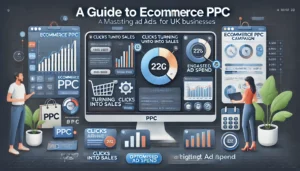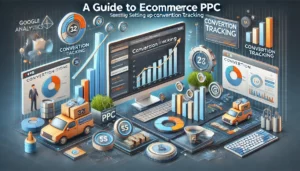Clicks that Convert: Mastering Ecommerce PPC for UK Businesses

Guide to Ecommerce PPC: In the fast-paced world of UK ecommerce, getting visitors to your site is only half the battle. The real challenge is turning those clicks into sales. This is where Pay-Per-Click (PPC) advertising shines. This guide will walk you through the essentials of mastering ecommerce PPC, from creating engaging ads to choosing the right agency. Whether you’re a beginner or an expert, you’ll find valuable tips to boost your online sales and get the most out of your ad spend.
Key Takeaways for our Guide to Ecommerce PPC
- Craft irresistible ad copy to capture your audience’s attention.
- Optimise landing pages to improve user experience and drive conversions.
- Select the right keywords to target UK shoppers effectively.
- Use local PPC strategies to reach customers in specific areas.
- Track and analyse PPC performance to refine your campaigns.
Crafting Compelling Ad Copy for Maximum Impact
Understanding Your Audience
To create ad copy that truly resonates, you must first understand your audience. Consider factors like demographics, interests, and goals. This helps you tailor your message to meet their specific needs. Knowing your audience is the cornerstone of effective ad copy.
Writing Persuasive Headlines
Your headline is the first thing potential customers see, so make it count. Use clear, concise language that grabs attention. Incorporate benefit-driven language to highlight what sets your product apart. A strong headline can significantly boost your click-through rate (CTR).
Incorporating Strong Calls to Action
A compelling call to action (CTA) is crucial for driving engagement. Use action-oriented phrases like “Buy Now” or “Get Started” to encourage immediate action. Make sure your CTA is clear and easy to follow, guiding the user towards the desired outcome.
By focusing on these elements, you can create ad copy that not only attracts clicks but also converts them into valuable actions.
Optimising Landing Pages for Higher Conversions
Designing User-Friendly Layouts
Creating a user-friendly layout is crucial for keeping visitors engaged. Your landing page should be clean and free of distractions. Focus on a simple design that highlights your main message and call-to-action (CTA). Use bullet points to break down information and make it easy to read. Ensure that your page loads quickly, as slow load times can drive potential customers away.
A/B Testing for Continuous Improvement
A/B testing is essential for optimising your landing pages. By testing different versions of your page, you can see what works best for your audience. Change one element at a time, such as the headline, CTA, or images, to understand its impact. Regularly update your tests based on the data you collect to keep improving your conversion rates.
Utilising Trust Signals and Social Proof
Trust signals and social proof can significantly boost your landing page’s credibility. Include testimonials, reviews, and case studies to show that others have had positive experiences with your product or service. Display any certifications or awards your business has received. These elements help build trust and encourage visitors to take action.
The key is to create a seamless flow from ad to landing page, reinforcing the message that caught the user’s eye in the first place.
Targeting the Right Keywords for UK Ecommerce
Conducting Thorough Keyword Research
To get better results from your online ads today, you need more than just the right keywords or the right bids. You need to deliver the helpful and relevant content that your audience is searching for. Start by identifying high-impact keywords that are closely related to your products or services. For instance, if you sell sports gear, you might choose keywords like “best running trainers.” This ensures your ad appears when users search for those specific terms.
Implementing Long-Tail Keywords
Long-tail keywords are longer and more specific keyword phrases that visitors are more likely to use when they’re closer to making a purchase. These keywords are less competitive and can help you reach a more targeted audience. For example, instead of targeting “running shoes,” you might target “best running shoes for flat feet.” This approach can drive more qualified traffic to your site.
Analysing Competitor Keywords (Guide to Ecommerce PPC)
Understanding what keywords your competitors are targeting can provide valuable insights. Use tools to analyse competitor keywords and identify gaps in your own strategy. This can help you discover new opportunities and refine your keyword list. By keeping an eye on your competitors, you can stay ahead in the game and ensure your ads are always relevant and effective.
Bold: Start by identifying high-impact keywords that are closely related to your products or services.
Italics: Long-tail keywords are longer and more specific keyword phrases that visitors are more likely to use when they’re closer to making a purchase.
Highlight: To get better results from your online ads today, you need more than just the right keywords or the right bids. You need to deliver the helpful and relevant content that your audience is searching for.
Leveraging Local PPC Strategies
Geo-Targeting for Local Audiences
Geo-targeting allows you to focus your ads on users in specific locations. This is especially useful for businesses with physical stores or those offering local services. By narrowing down your audience, you can ensure that your ads are seen by people who are more likely to visit your store or use your services. This increases the chances of conversion and maximises your ad spend efficiency.
Creating Location-Specific Ad Campaigns
When creating location-specific ad campaigns, it’s important to use keywords that include your city or region. For example, if you run a bakery in London, you might use keywords like “London bakery” or “best cakes in London.” This helps your ads appear in searches made by local users. Additionally, using location extensions in your Google ads PPC can highlight your business address, making it easier for potential customers to find you.
Measuring Local PPC Performance
To measure the success of your local PPC campaigns, you need to track key metrics such as click-through rates (CTR), conversion rates, and return on ad spend (ROAS). Tools like Google Analytics and Google Adwords PPC provide valuable insights into how your ads are performing. Regularly reviewing these metrics allows you to make data-driven adjustments to improve your campaigns.
Local PPC is a powerful way to connect with customers in your area. By focusing on location-specific strategies, you can drive more foot traffic and increase conversions for your business.
Guide to Ecommerce PPC: Measuring and Analysing PPC Performance
Setting Up Conversion Tracking
To truly harness the power of your PPC campaigns, setting up conversion tracking is essential. This allows you to see which ads are driving sales or leads. Use tools like Google Analytics to track these conversions. Without conversion tracking, you’re flying blind. Make sure to set up goals and funnels to get a clear picture of your customer journey.
Interpreting Key Metrics
Understanding key metrics is crucial for effective PPC management. Focus on metrics like click-through rate (CTR), cost per click (CPC), and return on ad spend (ROAS). These numbers tell you how well your ads are performing. For example, a high CTR means your ad is compelling, while a low CPC indicates cost-efficiency.
Adjusting Campaigns Based on Data
Once you have your data, it’s time to make adjustments. Regularly perform a Google ads audit to identify areas for improvement. Look at which keywords are performing well and which aren’t. Use this information to tweak your bids, ad copy, and targeting options. A thorough PPC audit can reveal hidden opportunities to boost your campaign’s performance.
Consistent monitoring and tweaking based on data can significantly improve your PPC results. Don’t set it and forget it; always be optimising.
Choosing the Right PPC Agency for Your Business
Evaluating Agency Expertise
Selecting the right PPC agency can make or break your online advertising efforts. Start by assessing the agency’s expertise. Look for a PPC agency that has a proven track record in your industry. Check if they have certified specialists and a history of delivering results. Don’t hesitate to ask for case studies or examples of their previous work to gauge their capabilities.
Understanding Pricing Models
Understanding the pricing models of different Google ads agencies is crucial. Some agencies charge a flat fee, while others work on a percentage of your ad spend. Make sure you know what you’re paying for and how it aligns with your budget. Transparency in pricing can save you from unexpected costs down the line.
Reviewing Case Studies and Testimonials
Before making a decision, review case studies and testimonials from previous clients. This will give you insight into the agency’s performance and reliability. A reputable London PPC agency will have plenty of positive feedback and success stories. Look for detailed case studies that show how the agency has helped businesses similar to yours achieve their goals.
Choosing the right PPC ad agency is a critical step in maximising your online advertising ROI. Take your time to research and select an agency that aligns with your business objectives and has a proven track record.
Conclusion for Guide to Ecommerce PPC
Mastering ecommerce PPC is crucial for UK businesses aiming to thrive in the competitive online market. By understanding the basics and implementing effective strategies, you can turn clicks into conversions and drive significant sales growth. Remember, the key is to continuously monitor and optimise your campaigns to ensure they are performing at their best. Whether you’re a beginner or a seasoned pro, the insights and tips shared in this guide will help you maximise your return on ad spend and achieve your ecommerce goals. Stay proactive, keep learning, and watch your business flourish.
Guide to Ecommerce PPC Frequently Asked Questions
What is PPC advertising and how can it help my UK ecommerce business?
PPC stands for Pay-Per-Click. It’s a type of online advertising where you pay each time someone clicks on your ad. For UK ecommerce businesses, PPC can drive targeted traffic to your site, leading to more sales and higher revenue.
How do I choose the right keywords for my PPC campaign?
Start by researching keywords that are relevant to your products. Use tools like Google Keyword Planner to find popular search terms. Look for long-tail keywords, which are longer, more specific phrases that can attract more targeted traffic.
What makes a good PPC ad copy?
A good PPC ad copy speaks directly to your audience. It should have a catchy headline, clear message, and a strong call to action. Make sure it addresses the needs or problems of your potential customers.
How can I improve the conversion rate of my landing pages?
To boost conversion rates, design user-friendly landing pages. Use clear headlines, engaging images, and persuasive calls to action. A/B test different versions of your page to see what works best. Adding trust signals like reviews can also help.
What is geo-targeting in PPC and why is it important?
Geo-targeting allows you to show your ads to people in specific locations. This is important for UK businesses because it helps you reach local customers who are more likely to buy from you. It makes your advertising more efficient and effective.
How do I measure the success of my PPC campaigns?
You can measure success by tracking key metrics like click-through rate (CTR), conversion rate, and return on ad spend (ROAS). Set up conversion tracking in your PPC platform to see how many sales or leads your ads are generating.
Author
Search Blog
Free PPC Audit
Subscribe to our Newsletter
The Voices of Our Success: Your Words, Our Pride
Don't just take our word for it. With over 100+ five-star reviews, we let our work-and our satisfied clients-speak for us.
"We have been working with PPC Geeks for around 6 months and have found Mark and the team to be very impressive. Having worked with a few companies in this and similar sectors, I rate PPC Geeks as the strongest I have come across. They have taken time to understand our business, our market and competitors and supported us to devise a strategy to generate business. I value the expertise Mark and his team provide and trust them to make the best recommendations for the long-term."
~ Just Go, Alasdair Anderson





